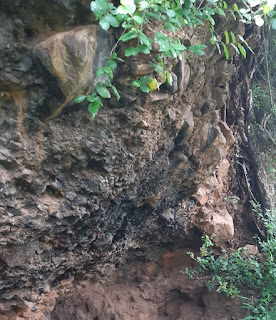Nsongezi Rock Shelter
| Nsongezi Rock Shelter | |
 |
|
| Image credit to Peter Nsiimire | |
| Type: | Archaeological Site |
| Country: | |
The Nsonzegi Rock Shelter is an archaeological site in Uganda. The Rock shelter is the only known site in Uganda that contains numerous Late Stone Age microliths.[1] It was at this site that artifacts dating back to the Stone Age were first found in Uganda.[2]
History
This site is located on the left bank of Kagera, which passes a river that has its origin in the Kigagati - Nsongezi gorge, the archaeological site was discovered during the year 1932 by E. J. Wayland.[3] In 1961, the site was re-excavated.[4] Artifacts found at the site range from Acheulean to Sangoan. Thanks to Wayland's work in the early 20th century, the site was excavated by Glen Cole. The pottery found at the site is of two types, Kansyore and Urewe.[5] A Dimple-based pot dating to A.D. 825 ± 150 has also been found at the site.[6] The wares found in the archaeological site present a cross-hatched decoration, black slips, and are characterized by a considerable burnishing.[7] One of the archeologists who worked on investigating the archeological site was Susannah Chapman Pearce who was a student at Oxford University, she also investigated other archeological sites in Uganda.[8]
Origins
There are several theories about the occupation of the rock shelter among them was that several hunter-gatherers inhabited the site, these people belonged to the culture that made the Kansyore pottery. Other theories include that they were of the Teso culture, which was related to the Twa people. Another theory is that they were part of the Wilton culture.[1]
References
Whelan, E. (2019) "Nsongezi Rock Shelter Offers Proof of Stone Age Craftsmen" Ancient Origins
Kyazike, E. (2022). Later Stone and Iron Age Cohabitation at the Nsongezi Open-Air Site, Western Uganda. Africa Review, 14(1), 1–23. https://doi.org/10.1163/09744061-20220001
Crane, H. R., & Griffin, J. B. (1962). University of Michigan Radiocarbon Dates VII. Radiocarbon, 4, 183–203. https://doi.org/10.1017/S0033822200036626 (Page 19)
Great Britain Colonial Office (1960). Uganda: Report for the Year. H.M. Stationery Office. (Page 143)
Shaw, I., & Jameson, R. (2008). A Dictionary of Archaeology. John Wiley & Sons. ISBN: 978-0-470-75196-1 (Page 433)
Konczacki, Z. A., Konczacki, Z. A., & Konczacki, J. M. (1977). An Economic History of Tropical Africa: The pre-colonial period. Psychology Press. (Page 9)
Posnansky, M. (1961). Pottery Types from Archaeological Sites in East Africa. The Journal of African History, 2(2), 177–198. (Page 183)
Weedman, K. (2001). Who’s “That Girl”: British, South African, and American Women as Africanist Archaeologists in Colonial Africa (1860s–1960s). African Archaeological Review, 18(1), 1–47. https://doi.org/10.1023/A:1006793522666 ISBN: 1572-9842 (Page 22)
